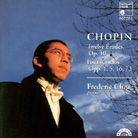 |
| June 15, 2004 Frederic Chiu: Chopin -- Twelve Études, Op.10; Four Rondos, Opp.1, 5, 16, 73
Chopin is a bit of a departure for Chiu, whose HM discography is otherwise made up almost exclusively of 20th-century material -- probing, insightful, enlivening accounts of the complete piano music of Prokofiev and individual works by the likes of Ravel, Schoenberg, and the all but forgotten "French Schoenberg," Abel Decaux. He has also given us a disc of Mendelssohn’s three oddly neglected piano sonatas filled out with that composer’s more familiar Rondo capriccioso. This collection revealed a fascination with the early Romantic period, and a compulsion to dig below the surface charm of such works to find the substance that defines their character. A character, to be sure, in which charm is an important factor -- though a somewhat differently constituted factor for Chopin than for Mendelssohn, and different again from one individual work to another. The general practice in recording the Chopin études has been to present both sets -- the 12 pieces of Op.10 and the 12 in Op.25 -- on a single CD. Chiu has been imaginative enough to give us the Op.10 set with Chopin’s far less frequently heard but very substantial rondos (all of them more conspicuously extended and developed than any of the études. Chiu points out the stylistic connections between the individual rondos and various études in his illuminating notes. While there are only four rondos -- Opp. 1, 5 (the Rondo ŕ la Mazur), 16 and 73 -- there are five performances on the CD. Chopin composed two versions of the C major, Op.73 -- one for piano solo, the other for two pianos -- and Chiu gives us both. By way of overdubbing, he plays both parts in the two-piano version. What makes this disc of further interest in the context of this department is that it happens to be a demonstration-class recording of Chiu’s piano.
The first of the 12 études, in C major (track 3), is a prime showpiece in this respect, with its dramatic exploitation of the extreme high and low ends of the keyboard. Both ends are rock-solid yet transparent, allowing an awareness of the instrument’s innards, in the most assuring sense, at the low end and a similarly assuring sense of depth beneath the upper-range glitter. This is an especially recommended track for testing or demonstrating the performance of a "serious" system, but the other 16 tracks are similarly useful in this respect. All the études are performed on a level that renders comparisons beside the point, and the rondos are not likely to find a more persuasive champion. Repeated exposure to this disc can only increase one’s admiration for the still remarkable music, for Chiu’s hardly less remarkable performances, and for the stunning level of consistently musical realism that can be achieved in recording a piano. ...Richard Freed
Ultra Audio is part of the SoundStage! Network. |
 This space has been devoted so far to
recordings that have to be hunted down in cutout bins or ordered from foreign retailers.
This time the subject is a recent CD that ought to be relatively easy to find:
Chopin’s Op.10 Études and all four of his rondos, played by the young
American pianist Frederic Chiu. The catalog listing is Harmonia Mundi HMU 907201. It is a
landmark issue in the discography of both the composer and the performer -- and, by no
means incidentally, quite a showpiece for the production team.
This space has been devoted so far to
recordings that have to be hunted down in cutout bins or ordered from foreign retailers.
This time the subject is a recent CD that ought to be relatively easy to find:
Chopin’s Op.10 Études and all four of his rondos, played by the young
American pianist Frederic Chiu. The catalog listing is Harmonia Mundi HMU 907201. It is a
landmark issue in the discography of both the composer and the performer -- and, by no
means incidentally, quite a showpiece for the production team. The piano has
always presented special challenges to recording engineers, and they have approached it in
various ways. Some place a microphone "inside," right over the wires that are
struck by the padded hammers. Some favor a more distant focus, from the perspective of a
seat in the hall or from an imaginary point between the audience and the stage. I have no
idea where Brad Michel placed his microphones at Skywalker Sound back in 1996, and if I
did know, it would not mean very much to me. The point is that this is an exemplary
recording of Chiu’s Yamaha -- the kind of sound that is exceptional in its own right
while giving a most appropriate boost to the performances. The sound is solid, well
focused, and exceptionally vivid.
The piano has
always presented special challenges to recording engineers, and they have approached it in
various ways. Some place a microphone "inside," right over the wires that are
struck by the padded hammers. Some favor a more distant focus, from the perspective of a
seat in the hall or from an imaginary point between the audience and the stage. I have no
idea where Brad Michel placed his microphones at Skywalker Sound back in 1996, and if I
did know, it would not mean very much to me. The point is that this is an exemplary
recording of Chiu’s Yamaha -- the kind of sound that is exceptional in its own right
while giving a most appropriate boost to the performances. The sound is solid, well
focused, and exceptionally vivid.